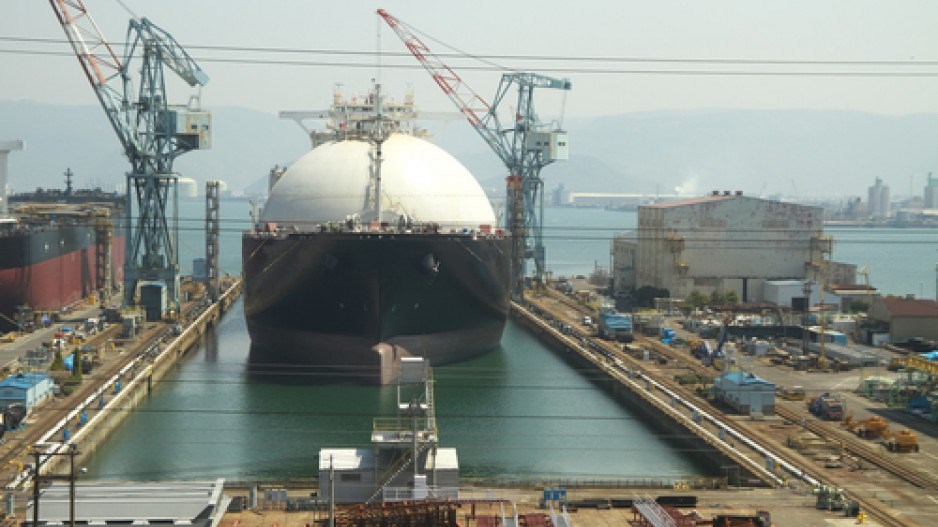When Tan Sri Dato Shamsul Azhard Abbas, CEO of Petronas, told the Financial Times earlier this week that his company might bail on its $36-billion plan to build a natural gas pipeline and liquefied natural gas plant in Prince Rupert, it may have been a bit of bargaining in the media, says one natural gas industry expert.
But it’s a threat Hank Petranik, president of the energy consulting firm Maxima Energy Services Inc., said B.C. officials should take seriously when they meet face-to-face with Abbas – a meeting that is expected to take place September 29.
Petronas is widely viewed as a frontrunner in the race to build B.C.’s first LNG plant – Pacific NorthWest LNG in Prince Rupert – and the last time B.C. missed the window to build an LNG industry in the 1980s, it literally went south, to Australia, which is on track to be the world’s largest LNG producer by the end of this decade.
“The way things are developing the project remains uncertain,” Abbas told the Financial Times earlier this week.
That follows a previous shot across the bow in May, when Abbas was in Vancouver for a B.C. government-sponsored LNG conference. He warned against “unrealistic expectations” – an apparent reference to the B.C. government’s promise that an LNG industry could generate $100 billion in tax revenue.
Progress has already invested billions in Canada, including $6 billion to acquire Progress Energy Resources and its natural gas assets in northeastern B.C. It plans to spend $10 billion to build an LNG plant in Prince Rupert, and billions more on a new pipeline.
But because many long-term LNG contracts are coming up for renewal, there is a window of opportunity that LNG developers need to work within, or risk losing important deals that they need to help finance their multi-billion projects.
Abbas has expressed impatience with Canadian and British Columbian governments over things like the tax rates that LNG developers in B.C. will pay – something that the B.C. government is still hashing out.
There are also concerns over the uncertainty that remains over unresolved native land claims and its potential impact on pipeline projects, which could delay pipeline projects from going ahead.
“Most of these contracts are 20 or 25 years,” Petranik said. “If you lose this window, or you get people concerned that this isn’t the place to do business, it’s not like they’re going to come back in two or three years. It could be decades before they come back.”
That happened in the 1980s, when three LNG export plants proposed for B.C. fizzled.
“They failed for a bunch of reasons,” Petranik said. “That Canadian market went to Australia. This is generational. This is not a case where, if we don’t do this one it will happen next year or the year after. The risk you run is that it’s another 25 years.”
There are now 19 LNG projects proposed for B.C., but realistically, only four or five are considered viable. One of the other frontrunners is Kitimat LNG. The lead company on that project is Chevron Corp. (NYSE: CVX). But it is losing a key partner – Apache Corp. (NYSE:APA) – which announced it plans to sell its share of the project.
Premier Christy Clark and Natural Gas Minister Rich Coleman have both recently downplayed Abbas’ threat to pull out of B.C. and remain optimistic that LNG plants will be built here.
David Austin, a lawyer specializing in energy policy, said he’s not surprised to see Abbas in hard bargaining mode.
“We’re at the point where there are some hard negotiations between federal and provincial governments with respect to proposed LNG facilities,” he said. “I’d be very surprised if we weren’t having hard negotiations.
“At the end of the day, it’s going to be the numbers that decide whether this plant is built or not and whether there’s demand for the product in Asia.”
As Austin points out, some of the factors that may decide the fate of Petronas’ Prince Rupert LNG proposal are not within the B.C. government’s purview, but market driven.
One that is, however, is a two-tiered tax for LNG that the University of Calgary’s School of Public Policy has criticized as a potential curb on investment.
In February, the B.C. government announced a tax on LNG plants that would start at 1.5% on net profits and rise to a maximum of 7%, after the initial capital investments are paid for. It’s not clear whether the B.C. government plans to stick with that plan, or adjust it, in response to negative reactions from the industry.
Jack Mintz, Palmer chair of the University of Calgary’s School of Public Policy, has criticized the tax , saying it could scare off investors.



